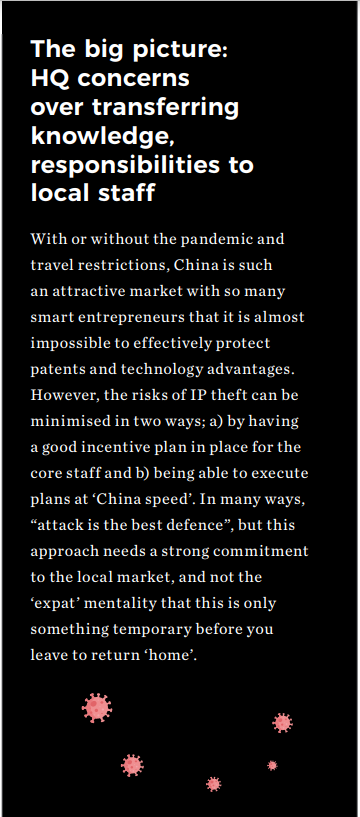
Are China-based companies losing experienced staff, or does localising the workforce have its own benefits?
In the initial stages of the COVID-19 pandemic, particularly after China closed its borders to most non-Chinese nationals in March 2020, many China-based European companies struggled to get back to operating as normal. Key staff members were locked out of China, business travel to Europe became impossible and, even within China, travel between different provinces was a logistical nightmare. Mirko Turrina of Goglio (Tianjin) Packaging Co., Ltd offers his own experiences as a case study of the ramifications, before looking at some best practices for multinationals.
The Small Picture: Impact on staff and working arrangements
As with most other companies, the sudden outbreak of COVID-19 disrupted our normal working rhythm. The travel restrictions in particular affected both the management and manufacturing departments. I was in Italy when the borders were closed, which made communication and the general reporting on activity difficult, while manufacturing staff were impacted by lockdowns and quarantines, which affected our normal shift-work schedule. Restrictions on travel within China meant business travel plans for the purposes of after-sales services, customer visits or to attend forums and seminars had to be postponed, or sometimes even cancelled.
Fortunately for us, our employees are all locals, and I am the only foreign national, so our disruption from the closure of China’s borders was reduced in comparison to other European companies. For established lines of production, any interruptions to training could be dealt with through utilising new communication technology options. This was not always the case for new products though. Eventually, staff were able to travel to Italy for training, but the long quarantine times and the fact that there was just one flight a week between China and Italy meant the time left for training was just a third of pre-pandemic levels.
Apart from the impact on normal working patterns, the travel restrictions and general instability caused by the pandemic also had an effect on staff morale in the early stages. Our global chair usually travels to China to join our annual parties, but not only was he not able to travel, the entire event had to be cancelled due to restrictions on large public gatherings. As the situation dragged on, we found ways to adapt and work with what was possible.
Headquarters/subsidiary decision-making divide

Decisions within the global organisation on how to deal with the fallout from the pandemic were made by prioritising compliance with local requirements. Decisions on operations-mode adjustments—like switching to remote working, policies on business travel—could be made by local management, while responsibility for strategic and investment decisions was shared with the board of directors in Italy. In addition, as our local financial department employees have been with us for a long time and are very reliable, our HQ could give us more autonomy on that side of things.
One interesting observation I made was that while the inability of the directors to travel to China made the decision process for very important topics slower, it actually had the opposite effect on minor issues, which began to be dealt with much faster.
In terms of intellectual property, as our staff in China are all local, we are accustomed to transferring knowledge locally. The travel restrictions meant that IP for new products could not always be transferred in person, so secure online systems had to be found.
The Big Picture: HQ concerns over transferring knowledge, responsibilities to local staff
With or without the pandemic and travel restrictions, China is such an attractive market with so many smart entrepreneurs that it is almost impossible to effectively protect patents and technology advantages. However, the risks of IP theft can be minimised in two ways; a) by having a good incentive plan in place for the core staff and b) being able to execute plans at ‘China speed’. In many ways, “attack is the best defence”, but this approach needs a strong commitment to the local market, and not the ‘expat’ mentality that this is only something temporary before you leave to return ‘home’.
Autonomy for regional branches
Legally, any company is an entity on its own with obligations to the authorities and society (employees, customers and suppliers), even though ownership may be in the hands of an overseas entity. Therefore, the local management team has the duty to utilise the local company’s assets to the utmost, and in line with the articles of association and any market separation agreements.
Regional branches should have autonomy on all the aspects that involve cultural traits or sensitivities, from product development to localisation to market development, but also important is autonomy on local human resources management and related incentive plans. Scientific research, global economies of scale, supply chain integration, compliance, financial controlling and management of key global accounts are activities where coordination with HQ is valuable for both the bottom line and for branding. Coordination with other overseas regional branches is definitely useful in terms of learning about market trends happening elsewhere, and for sharing improvements to operations and lessons learned.
In the past, China absorbed technology and knowledge from overseas and adapted them to its own needs. Nowadays, it is perceived as arrogant when a product is promoted only based on its positive track records overseas. The domestic market is a lot more confident.
The balance between autonomy and control should be based on a thorough risk assessment. Many HQs tend to retain more control over regional branches in an attempt to reduce the costs of mistakes of local teams, which creates a very negative loop for HR retention and development. Companies’ ability to retain and motivate local talent is clearly linked to cultural traits. It is no secret that great talents target companies that will empower them and provide them with opportunities to grow together.

The future for HQ/subsidiary communication
Digitalisation is the main trend, and has been embraced by most companies. It has its benefits and drawbacks. In terms of benefits, remote working—apart from reducing infection rates—saves staff time commuting to and from work – surveys have shown the average commuting time is around 70 minutes.
The drawbacks are remote working is not suitable for all companies or all job functions. Furthermore, work efficiency can be low, as it depends on individual employees’ self-discipline. Remote working can also hinder projects that require teamwork or face-to-face communication.
Mirko Turrina is general manager of Goglio (Tianjin) Packaging Co., Ltd. Prior to joining Goglio, Mirko mostly worked in the machinery sector, with some experience also of the automotive and plastic packaging. During his two decades in China, Mirko developed a proven track record in industrial small and medium-sized enterprises. Goglio Group, established in Milan, Italy in 1850, is a family-owned multinational company, and a leader in flexible packaging solutions, well-known for its Fres-co system for processed coffee and fruit products. Goglio (Tianjin) Packaging Co., Ltd opened in January 2006. The company’s vision is to create solutions to keep food fresh and healthy during storage and transportation through continuous improvement of technology.


Recent Comments